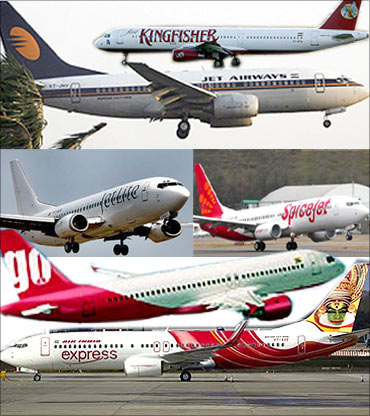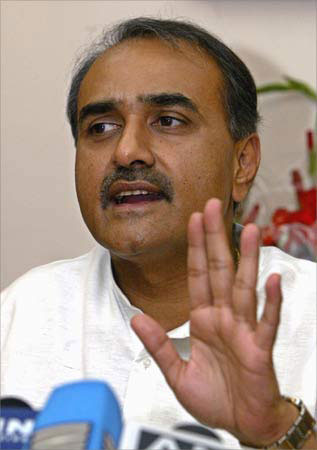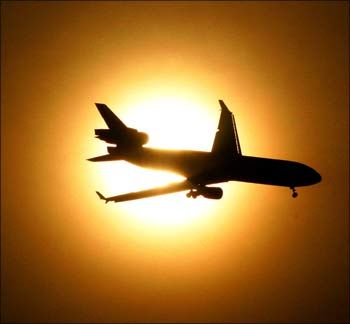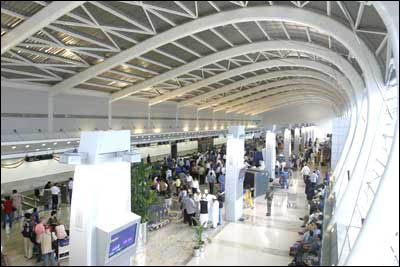Photographs: Reuters T N Ninan
Whatever post-reform Indian capitalism is, one thing it isn't -- and that is an untrammelled 'free market' system.
At a time when the government pretends to be responding to extortionate pricing by the airline companies, libertarians are critical; they would like the airlines to be left free to charge what the traffic will bear.
This assumes the existence of a 'free market' (i.e., no cartelisation). It is also argued that no one came to the airlines' aid when they were losing copious sums in recent years.
This is contentious terrain. There are reputed economists who agree with the libertarians and argue that imposing price controls prevents price discovery and inhibits future supply.
This assumes that market forces are in fact allowed to operate, and ignores the 'lumpiness' and time-delays involved in fresh supply.
. . .
Do this first, then ask people to pay higher airfares
Image: Civil Aviation Minister Praful Patel.Photographs: Reuters
Given imperfections in most markets, it is understandable that all mature democracies have some sort of law against price gouging.
Typically, European law is more encompassing than American law; sometimes, the law is not part of any anti-trust or pro-competition enactment, and is simply designed for consumer protection.
Coming to airline fares, the Competition Commission should have stepped in by now and checked whether there is cartelisation and price fixing.
But the evidence suggests that the Commission is no more effective than its predecessor, the deservedly defunct Monopolies and Restrictive Trade Practices Commission.
. . .
Do this first, then ask people to pay higher airfares
Photographs: Reuters
What of the sector regulator? The proposed Civil Aviation Authority is still work in progress, so the old-style Directorate-General of Civil Aviation has stepped into the breach.
But the DGCA is poorly staffed and probably not equipped to take a decision that recognises contemporary thinking on competition and cases of extreme pricing.
For all practical purposes, therefore, it is the minister for civil aviation who is driving the action, and his record does not encourage confidence.
What makes the story more interesting is the flip side of the coin. Does untrammelled capitalism, of the kind that the libertarians favour, exist when it comes to the airline owners and the private airport companies?
. . .
Do this first, then ask people to pay higher airfares
Photographs: Reuters
Kingfisher Airlines, for instance, is piled so high with debt that the equity-holders should have lost all value, and the lenders should have taken charge of the airline's assets -- as the US government did with General Motors.
Instead, we have the equity-holder in place while public-sector banks who are lenders take a hair cut (through the conversion of loans into equity)! More such deals are in the works, ostensibly because the government wants to defend itself against any charge of being partial to Air India when dishing out rescue packages.
This is hogwash, of course, because the government happens to be the equity-holder in Air India and is taking the hit in that capacity.
But as the telecom scandal shows, this is a government susceptible to special interests.
. . .
Do this first, then ask people to pay higher airfares
Image: Mumbai international airport.Photographs: Reuters
That includes the airport companies. Whether in Delhi, Mumbai or Hyderabad, they have rewritten their agreements with the government, to their advantage of course.
In Delhi, the attempt is to rewrite it not once but twice. At Hyderabad's Shamshabad airport, the traffic is twice as much as initially projected -- and this should have underwritten the airport's profitability.
Yet, the government is allowing the airport company to impose unplanned levies on passengers. And in Mumbai, the airport company's shares have changed hands at massive premiums, but the government thinks the company needs financial help.
If the rules of capitalism are to apply, they should apply first to producers who all have their Niira Radias, before customers are asked to fork out more for a Delhi-Mumbai flight than for Delhi-London.







article